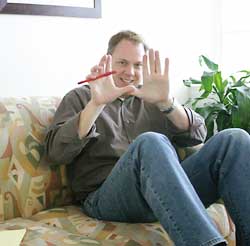
 |
jescom | meetings | documents | links | sjweb |
Loyola Productions, Los Angeles, California

Father Eddie Siebert SJ
President, Loyola Productions
Four years ago Loyola Productions started operations, working out of borrowed space in the Jesuit community at Loyola Marymount University. Then friends gave them office space on Wilshire Boulevard in downtown Los Angeles. When I visited them in late October, they were just settling into their new home on the second floor of a small office building in West L.A. in the district where many production companies are now moving. The eight full-time employees have space for the computers and screens on which they do planning and post-production, but the rooms are not overly fancy, and the furniture clearly shows the generosity of many friends whose donated desks and chairs give the place an eclectic air. Loyola's focus is on the work, not on Hollywood glitter, and they already have an impressive resume of videos done for Jesuit schools and provinces.
Father Eddie Siebert of the Detroit province is founder and president. Father Paul Campbell (from Ireland by way of New York) is head of the educational projects they are doing with Loyola Press and Brother Michael Breault is working part-time in their network TV pilot as well as serving as minister in the novitiate. The rest of the staff are young talent who relish the opportunity to get a track record. Although the pace can be intense, Siebert thinks the peaceful working atmosphere makes Loyola Productions attractive to talented young film-makers. Siebert has the responsibility for raising funds to cover overhead. Their documentaries earn enough to cover basic costs, but they have to work to get funds for new productions, especially the pilot for their new show that hope to air on network TV.
Their work can be divided into three main areas:
1) Corporate communication videos commissioned by Jesuit provinces and schools. They have done videos for the California and Chicago provinces, and for several high schools. Their programs have been well-received and have generated a good return for the schools that commissioned them.
2) Educational products done in collaboration with Loyola Press in Chicago. They did a video on "Why go to Church?" with Father J. Glenn Murray SJ which has been very successful; they are now working on a second tape. They are doing a series on prayer which will go along with other products from Loyola Press.
3) Network programs: they are working on a pilot for a show called "Hidden Treasures of the Jesuits." The pilot program features the discovery of the Caravaggio painting, The Betrayal of Christ, in Dublin. Father Michael Tueth SJ acts as a sort of detective, puzzling out the back story behind the two murders associated with the history of the painting which had hung unrecognized for decades in a Jesuit refectory in Dublin. The program follows a somewhat distinctive format that could be called "docudrama" in that they visit the actual sites where things happened, and show footage of Tueth investigating the story as well as dramatic reenactments of the story, along with interviews. The goal is to bring a historical story to life.
Siebert's goal is to produce 13 one-hour episodes per year. His plan is to shop around the pilot in the hope of selling the concept to a company that will then pay them to create the shows. The estimated cost of a one-hour program is between $500,000 to $1,000,000.
The basic concept is to take some little-known historical episode an explain it in a way that exposes a broad audience to basic values and ideas that Jesuits represent. The shows aim at high production value and try to be well-written and smart, but accessible to a broad audience. The trailer that I saw shows that the program looks like it was done by a mainstream, high-quality production company. Were that not so they would not have a chance of getting on air. Some of their productions are being done on the very latest high-definition digital cameras. So they are aiming high. Such programs cost a lot but the networks pay to air them. If the concept does work, the productions would be self-subsidizing. The network program is very ambitious; and the challenges are great. I think they have a chance, and I admire them for trying it.